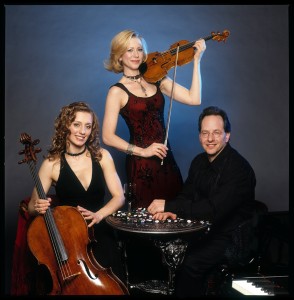
20 Jun 11th Annual Telluride Musicfest: Overview of “Bohemians”
 A series of four house concerts begin Wednesday, June 26, through July 7
A series of four house concerts begin Wednesday, June 26, through July 7
BOHEMIANS:
Beethoven and “bohemianism” share more than an alliterative bond. According to bravura violinist and music historian Maria Bachmann, also artistic director of the Telluride Musicfest, the iconic composer’s revolutionary thinking anticipated the nationalism of late 19th-century Europe and the rise of the “frankly-my-dear-I-don’t-give-a-damn” culture later dubbed “bohemianism.”
“Beethoven had the revolutionary idea that he was the equal of the royalty of his time. Expressing the idea of equality, as he did, was unheard of in his time and quite controversial,” explained Bachmann. “That kind of free thinking progressed and eventually gave rise to nationalism in the latter half of the 19th century. Throughout time, artists like Beethoven have often been on the forefront of revolutionary thinking.”
“Bohemien” is a French word for “gypsy.” The original “bohemians” were travelers or refugees from central Europe. In modern usage the term is applied to people who live unconventional, usually artistic lives.
“Bohemians” is the theme Bachmann selected for the 11th annual Telluride Musicfest. The series of dazzling house concerts, presenting the music of Beethoven, Saint-Saens, Dvorak, Smetana, Giannini, Liebermann, Chausson, Piazzolla and Taneyev, begins Wednesday, June 26 and run through Sunday, July 7.
“Bohemian folk melodies are beautifully expressive, there’s a sense of emotions being very close to the surface, and Bohemian rhythmic impulses are unique in Eastern European music. In the time of Dvorak and Smetana (late-19th Century), nationalism was emerging politically and culturally. The Romantic movement in music, which started toward the end of Beethoven’s life, had evolved to reflect the zeitgeist of the day. Composers, especially in countries that were not autonomous, wrote music that expressed their own countries’ folk music. That aligned them artistically with the political movement of nationalism and with national pride. Smetana also participated in the failed uprising against the Hapsburg monarchy that ruled his native Bohemia,” Bachmann adds.
MUSICFEST ARTISTIC DIRECTOR & PERFORMERS:
The gravitational center of Telluride Musicfest is, as we said, Bachmann and Trio Solisti: Bachmann on violin, cellist Alexis Pia Gerlach, and pianist Jon Klibonoff.
Bachmann is a charismatic violinist who combines outstanding musicianship with dazzling technical command and tones of exceptional purity. She has performed over the world in venues such as The Kennedy Center in Washington, D.C, Carnegie Hall and Lincoln Center in New York, The Opera Comique in Paris, and The Musikverein in Vienna.
The New York Times hailed Maria Bachmann as “a violinist of soul and patrician refinement.” The Boston Globe has praised her as “astonishing in every musical and technical regard.”
Inspired by their collaboration on the Cesar Franck Sonata in Telluride, Bachmann and pianist Adam Neiman recorded a CD of works by Franck, Debussy and Saint-Saens.
“Exceptionally beautiful tone and an intensity that could melt asbestos… Bachmann manages to entice the listener via subtle inflections while maintaining the proper emotive balance…absolutely soars, so magically intense it is even in the soft passages…Bachmann and Neiman resound with supple poise and requisite explosive power,” said Fanfare.
Trio Solisti’s performances are soulful, passionate and marked by virtuosity, electric energy, seamless ensemble playing, and thrilling abandon, qualities have drawn high praise from The New York Times (“consistently brilliant”) and The Washington Post (“unrelenting passion and zealous abandon in a transcendent performance”).
The group’s recent release of Dvorak Trios garnered more accolades:
“In this trio’s hands, Dvorak’s music emerges as a real story with ups and downs…Trio Solisti captures all of the Bohemian-Czech rhythms with exactly the right accent,” raved Fanfare.

Maria Bachmann (center), Alexis Pia Gerlach, Jon Klibonoff of the Trio Solisti
Returning to Telluride to join Bachmann and Solisti are Adam Neiman, Toby Appel, and Kathryn Lockwood. In addition two very special artists join Telluride Musicfest this year: Cellist Edward Arron has performed with Yo-Yo Ma and is the Artistic Director of the NY Metropolitan Museum Artists in Concert series. Violist Richard O’Neill is one of the few violists to receive The Avery Fisher Career Grant and a Grammy Award nomination. His concerto appearances have taken him from Los Angeles to The Kennedy Center and to Korea. He is a recording artist on Deutsche Gramophone and an artist of the Chamber Music Society of Lincoln Center.
2013 CONCERTS & SYNOPSES
(Maria Bachmann’s concert notes below are italicized)
June 26, 2013 – Concert 1 at 7:30 p.m. at Mai Home
Saint-Saens: Trio in F major, Op 18
Smetana: Trio in G minor, Op. 15
Dvorak: Piano Quintet in A major, Op. 5
Artists: Toby Appel, Kathryn Lockwood, Adam Neiman, Trio Solisti
Saint-Saens, who led a scandalous personal life, was one of the bad boys of French music and he championed chamber music at a time when French
composers thought it to be a Germanic form. Nevertheless, his 1st piano trio is a virtuosic showcase that takes the musicians and audience on a wild and wooly ride.
Smetana, who participated in the failed uprising against the Hapsburg monarchy ruling Bohemia, composed his music with the same emotions that fueled his political passions.
But the work we will present, his piano trio in G minor, was written after the death of his youngest daughter.
Dvorak’s piano quintet Op 5 is an early masterpiece that is rarely performed and has a Bohemian flavor we love! I hope you do, as well.
June 30, 2013 – Concert 2 at 7:30 p.m. at Mai Home
Beethoven: Sonata No 7 in C minor for violin and piano
Dvorak: Piano Quartet in D major, Op 23
Giannini: Piano Quintet in F sharp minor
Artists: Toby Appel, Kathryn Lockwood, Adam Neiman, Trio Solisti
Beethoven had the revolutionary idea that he was not only equal to, but superior to the royalty of his day, some of whom were also his patrons. His compositional style revolutionized classical music. The C minor Sonata is full of his passion and is one of my favorites.
Dvorak’s D major Piano Quartet is another gorgeous work with great solos for everyone and another early masterpiece! Vittorio Giannini(1903-1966) was actually an American neo-Romantic composer and while 20th Century American composers were going in many other directions, Giannini wrote music influenced by Wagner, Franck and Debussy. His piano quintet is a powerful and stunningly beautiful work!
July 3, 2013 – Concert 3 at 7:30 p.m. at Mai Home
Dvorak: Bagatelles, Op. 47
Liebermann: Piano Quintet, Op. 34
Chausson: Piano Quartet in A major, Op. 30
Artists: Trio Solisti, Toby Appel, Edward Arron, Adam Neiman,
Richard O’Neill
Dvorak’s Bagatelles are originally written for 2 violins, cello and an unusual instrument called the harmonium, but this part can be performed on piano instead – as we will.
In these 5 short Bagatelles, Dvorak presents us with some of his most beautiful Bohemian melodies. Lowell Liebermann, a New York composer, wrote this exceptional
piano quintet in 1990. Trio Solisti premiered a new work by Lowell earlier this year and we love this piano quintet and wanted to bring it to Telluride.
With some similarity to the romantic style of Prokofiev, this piece will astound with its’ virtuosity and emotional scale. Ernest Chausson championed the controversial music of Richard Wagner and his quartet is a masterpiece influenced by his heroes Wagner as well as fellow Frenchman Cesar Franck.
July 7, 2013 – Concert 4 at 7:30 p.m. at Mai Home
Piazzolla: Four Seasons of Buenos Aires
Dvorak: Piano Quintet in A major, Op. 81
Taneyev: Piano Quintet in G minor, Op. 30
Artists: Trio Solisti, Toby Appel, Edward Arron, Adam Neiman,
Richard O’Neill
Astor Piazzolla revolutionized Tango music forever and legitimized it all the more by bringing it into concert halls. We challenge you to sit still as you hear these fabulous South American tango rhythms.
Dvorak’s late piano quintet is one of the most beloved works in all of chamber music, and embodies his mature style. He relies on both Slavic & Bohemain melodic material for inspiration. Sergei Taneyev was a good friend of Tchaikovsky and performed the premiere of his 1st piano concerto. Taneyev’s quintet is on the level of the greatest works of Brahms and Dvorak. He’s a real discovery.
TICKETS:
Call Warner Paige at 970-369-1351


Sorry, the comment form is closed at this time.